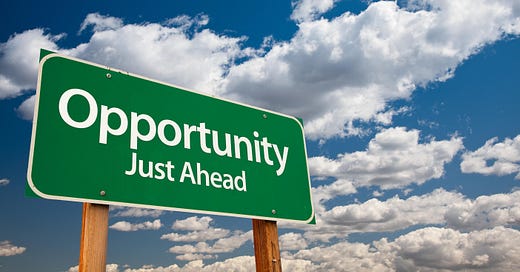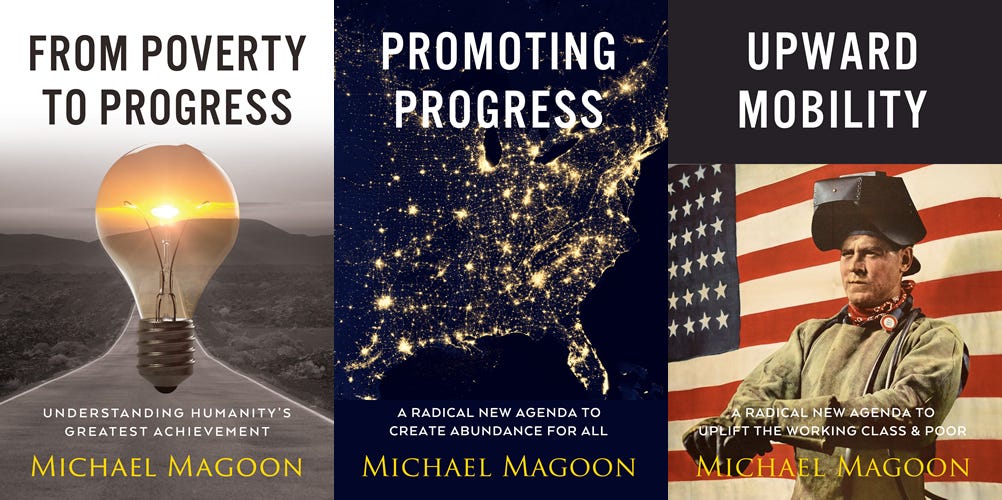Why Equality of Opportunity is not enough
And why Upward Mobility is a better goal
In a previous article, I argued that Equality of Outcome (a common goal of the Left) is:
Impossible to achieve
Any attempts to achieve it will lead to negative outcomes for society.
Equality of Opportunity is often presented as a reasonable alternative to the goal of Equality of Outcome. Many conservatives and also often those on the Center-Left believe that the real goal of American society should be promoting equality of opportunity.
While the Left focuses on equality of outcome, the Right typically wants to make sure that no laws or regulations interfere with freedom of choice. They also believe that once equality of opportunity has been achieved, the government should not spend large amounts of money on social programs.
In general, conservatives believe that equality of opportunity in America has been largely achieved. Therefore, they want a significantly smaller welfare state than the Left desires.
See more articles on Upward Mobility:
Why Progress and Upward Mobility should be the goal, not Equality
Why Equality of Opportunity is not enough (this article)
I also will be writing a significant number of excerpts from my forthcoming book: Upward Mobility: A Radical New Agenda to Uplift the Poor and Working Class. Most of these excerpts will only be available to paid subscribers.
Other books in my “From Poverty to Progress” book series:
What is Equality of Opportunity?
Equality of opportunity sounds simple, but it is not. Like all political concepts, there are great disagreements on the definitions of words. In this case, there is no clear agreement on what the word “opportunity” means.
While conservatives focus exclusively on governmental restrictions on opportunity, the Left focuses on perceived societal restrictions on opportunity. Those on the Left typically argue that when different social groups have substantially different outcomes, this is evidence of differing levels of opportunities. Conservatives argue that expanding the definition of opportunity so broadly robs the concept of its meaning.
In this article and my book, I will adopt the conservative definition of opportunity and restrict it to government policy. In terms of the definition of opportunity, I believe that conservatives are largely correct.
Equality of Opportunity is about:
Equal political rights
Equal right to due process
Equal rights to participate in the economic system
Sports is an example
I think that it helps to think of sporting leagues. Every athletic competition has rules that apply equally to all contestants. Those who establish the rules are not the athletes and the rule makers have no vested interest in the outcome. The rules are typically published transparently and all the athletes have at least a general understanding of those rules. Most sporting events also have referees or judges who ensure that all athletes adhere to the rules.
The fact that some athletes come out ahead in victories or medal count cannot be used as evidence that the rules are unfair. Very large differences in outcome are the expected outcome in sporting events. It is literally winner-take-all in most cases. We all understand that some athletes are genetically blessed, received better training in their childhood, or in some way were given an inherent advantage that does not conflict with the rules.
And if an athlete cheats and gets an unfair advantage, it is not assumed that this means the rules are unfair. It likely means that the league needs better enforcement.
These “rules of the game” are established and enforced to encourage each of the athletes to use maximum effort during practice and competition. The result is that everyone improves themselves, and fans can enjoy the thrill of competition and a sense of wonder at the most spectacular achievements of the best athletes.
All of the above is why we need Equality of Opportunity.
I agree with conservatives that equality of opportunity has largely, though not completely, been achieved. While perfect equality of opportunity has not been achieved, equality of opportunity is at least as high as in any society that has ever existed. That is something that we all should be proud of and seek to keep in place.
Humans copy behaviors that surround them
On the other hand, I agree with those on the Left that the goal of Equality of Opportunity is not enough. In my first book, From Poverty to Progress: Understanding Humanity’s Greatest Achievement, I argue that copying other people’s behavior is an extremely important part of human behavior.
Humans are not rational animals that carefully think through every decision. We take intellectual shortcuts by copying other people’s behavior, particularly those who are close to us regularly. Children, in particular, copy the behavior of adults around them without having a clear understanding as to why the adults are engaging in such behavior.
Humans, particularly young ones, often copy just to copy. This strategy offers huge benefits by enabling humans to copy what appears to be working.
This is in itself not a problem. Indeed, as Joseph Henrich argues in his book, copying is one of humanity’s “secrets of success” (a summary is here) Copying enables people to learn from all the trial-and-error experimentation that previous generations have done. Copying enables people to skip directly to implementing the results that worked best in the past.
Unfortunately, this intellectual shortcut often leads to problems. If the people being copied are not successful, it is possible to inadvertently copy dysfunctional behaviors and beliefs. This is often the case for youth who were born into low-income families.
One can also attempt to copy a successful person but be incorrect on what behaviors need to be copied. Corporations often seek endorsements from athletes, actors, and other celebrities for their products.
The implicit message in commercials is “Using this product is how I became such a success. If you buy this product, you can be just as successful as me.” Of course, this is rarely the case, but the marketing tactic is apparently successful. Most likely celebrity endorsements work because of our innate desire to copy.
It is simply untenable to teach our children: “We live in a Land of Opportunity, so go get em!” and leave it at that. In our modern world, the number of options that youth have is so great and so many of those options are bad for their long-term future while being very enticing in the short-term.
And worse, many successful people publicly embrace “luxury beliefs” that run diametrically opposed to their actual life choices and what they teach their own children. One hint to overcome these lies is to not listen to what successful people say. Watch what they did to achieve their success. Actions speak much louder than words.
Life Choices
I believe a critical concept that we must embrace is “Life Choices” for youths. The age between 14 and 30 (which I call “youths” or “young people”) is a critical period in an individual’s life where one is required to make life choices about the following:
Education
Job Skills
Criminality and violence
Sexual activity and contraception
Relocation to regions with greater economic opportunities
Occupation and work effort in the occupation
Marriage
Having children and parenting
These Life Choices are extraordinarily important in determining the probability of long-term success and happiness after the age of 30. Few people make perfect choices, but the relative number of correct choices plays a critical role in life outcomes.
Note that I say “probability of” instead of outcome. Everyone is affected by luck in their lives. We all have bad events that occur. We are also all born with different genes that have a large impact on our preferences and abilities. But given a large group of people making similar choices, they will tend to have very different outcomes compared to a large group of people making very different life choices.
Youths often make poor choices
The age between 14 and 30 is, unfortunately, also a time when young people’s brains are not fully formed, and they are often heavily swayed by the opinions of their friends, the media, and social media. Many youths even enjoy playing the rebel and going against the conventions of the older generation for their own sake.
Many of these youths, particularly those from low-income families, grew up in dysfunctional families or neighborhoods with few role models for success. Some of the worst only have very negative role models to copy.
Life choices typically involve short-term sacrifice and long-term benefits that often take decades to be fully realized. Youths, in particular, have a difficult time disciplining themselves to focus on long-term benefits rather than enjoying short-term pleasure.
Many of these choices also involve spending money. Education beyond high school, job training, relocation, and others require money. Unfortunately, these choices are at an age when a person’s earning power in the marketplace is unusually low. Employers pay higher incomes to those with greater experience and skills. Few people between 14 and 30 years old have either. This can often force youths to pass up on opportunities that require money to pay for.
These choices are made at a time when youths are also learning about sexuality and experiencing sex for the first time. If such experimentation leads to an accidental pregnancy, their entire life trajectory can be pushed in a radically different direction. This is particularly true for girls and women.
Society has a vested interest in wise Life Choices
When individuals make bad choices, all of society is hurt. Any person who lives in poverty, is underemployed due to a lack of skills, lives in a region without economic opportunities, or raises children in a dysfunctional environment imposes a triple burden on society. First are the negative consequences of their behavior that are imposed on society. Second, are the missed opportunity costs of an individual who is not making contributions to society. Third, is the negative role model that they become to the people around them. So society has a vested interest in helping low-income youths to make the right choices.
If all we were talking about were a relatively small group of people, then it might not matter. But tens of millions of Americans are living far below their potential. This often ruins their lives and diminishes what they can contribute to society. No American should find this an acceptable state of affairs.
Equality of opportunity is a desirable goal and one that has been largely achieved. It is not, however, enough to enable low-income youths to make wise choices that enable them to share in the benefits of the progress that surrounds them. We need social programs that help them do so.
An alignment of incentives
The fundamental problem is that the vast majority of social programs are not made with those life choices in mind. Those social programs offer short-term incentives that do not align with the long-term incentives of individuals and society in general.
But economic incentives are not enough. We also need moral incentives. Humans have an amazing ability to sacrifice their short-term self-interest based on strong moral convictions. So in addition to the proper material incentives in our social programs, society needs to promote moral values that align with the long-term incentives of individuals and society in general.
In short, we need:
To overhaul our social programs so they offer short-term economic incentives that align with good long-term outcomes for individuals and society in general.
To overhaul the values that we teach children so they are willing to make short-term sacrifices in the vitally important years between ages of 14 and 30 that lead to far better outcomes for themselves.
Wise choices promote Progress
One of the best things about my concept of Upward Mobility is that it aligns with Progress (or long-term economic growth). I believe promoting Progress should be the #1 goal of government. But I believe that Upward Mobility should be goal #2 of government. Fortunately, they rarely conflict. Upward Mobility is primarily about making wise life choices to participate in the progress that surrounds them.
When youths make wise choices, they contribute to their own Upward Mobility. A higher material standard of living for an individual creates:
Larger markets for everyone else
Higher tax revenues
Role models for their peers
Role models for the next generation of youths to follow
Better parents for the next generation
All of the above contribute to Progress for the rest of society.
Win-win
See more articles on Upward Mobility:
Why Progress and Upward Mobility should be the goal, not Equality
Why Equality of Opportunity is not enough (this article)
I also will be writing a significant number of excerpts from my forthcoming book: Upward Mobility: A Radical New Agenda to Uplift the Poor and Working Class. Most of these excerpts will only be available to paid subscribers.
Other books in my “From Poverty to Progress” book series:













You identify one of the “blind areas” of the Progress Studies movement: individual progress.
This is something that I have tried to rectify at Risk & Progress. I have written a few articles about individual/personal development. I just lack the time to follow through with more at this time.
Individual development is critical to societal development, and vice versa. We can fuse the two into one cohesive narrative for sure.
Interested in seeing where this new topic is going. I agree so far.